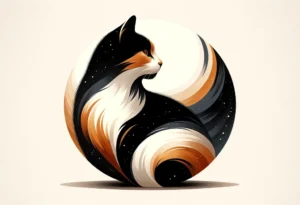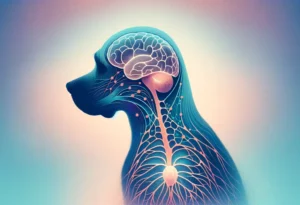Cats are fascinating creatures, known for their independent nature and unique behaviors. Many cat owners may wonder about the possibility of cats having Down syndrome, a genetic disorder that affects humans. But why can’t cats have Down syndrome?
While cats can have genetic disorders, Down syndrome specifically is unique to humans due to differences in chromosome structure. This means that cats do not have the same genetic makeup as humans, making it biologically impossible for them to have Down syndrome. So, why can’t cats have Down syndrome? Let’s explore the reasons in more detail.
Genetic Differences Between Cats and Humans
Have you ever wondered why cats can’t have Down syndrome like humans do? Well, it all comes down to our genetic makeup. Humans have 23 pairs of chromosomes, while cats have only 19 pairs. These chromosomes carry our genetic information, and when it comes to Down syndrome, it’s caused by an extra copy of chromosome 21 in humans.
Since cats don’t have the same number or arrangement of chromosomes as humans, they simply can’t develop Down syndrome. While cats can have their own set of genetic disorders, Down syndrome is not one of them due to these fundamental genetic differences.
Feline Genetic Disorders
When it comes to genetic disorders in cats, there are a variety of conditions that can affect our feline friends. From polycystic kidney disease to hypertrophic cardiomyopathy, cats are susceptible to a range of genetic issues that can impact their health.
However, it’s important to note that Down syndrome is not one of the genetic disorders that cats can develop. This is because the genetic abnormality that causes Down syndrome in humans is specific to our chromosome makeup, which differs significantly from cats. So while cats may have their own genetic challenges to navigate, Down syndrome is not one of them.
And remember, if you ever have concerns about your cat‘s health, always consult with your veterinarian for guidance and support.
Symptoms of Down Syndrome in Humans
When it comes to understanding why cats can’t have Down syndrome, it’s crucial to consider the specific symptoms that are characteristic of this genetic condition in humans. Individuals with Down syndrome often display physical attributes like a small stature, flat facial features, and a single crease across the palm of their hands. Additionally, they may experience cognitive delays, heart defects, and other health issues that are unique to this syndrome.
However, when we observe our feline friends, we don’t see these same symptoms manifesting. Cats have their own set of genetic traits and predispositions that make them distinctly feline. Their physical appearance and behavioral patterns are governed by completely different genetic factors that set them apart from humans with Down syndrome. This stark contrast in symptoms highlights the biological differences between the two species, reinforcing the fact that cats simply cannot develop Down syndrome.
Feline Behavioral Traits
Cats are known for their independence, agility, and unique ways of interacting with the world around them. These distinctive behavioral traits play a key role in why cats can’t have Down syndrome. Unlike humans, who rely heavily on social interaction and communication skills, cats are more solitary creatures that navigate their environments with keen senses and stealthy movements.
Moreover, cats exhibit a range of behaviors such as stalking, pouncing, and grooming that are innate to their species. These behaviors are ingrained in their genetic makeup and contribute to their overall well-being and survival in the wild. Given these natural feline instincts and behaviors, it becomes clear that the characteristics of Down syndrome, which are specific to humans, are not applicable to cats.
In addition to these factors, here are some other key reasons why cats can’t have Down syndrome:
- Genetic Variations: Cats and humans have distinct genetic makeups that dictate their physical and cognitive processes.
- Evolutionary Differences: Cats have evolved separately from humans, leading to unique behavioral and physiological traits.
- Species-Specific Adaptations: Cats have developed specialized abilities and behaviors that are tailored to their survival in different environments.
By considering these factors, it becomes evident that cats are not susceptible to Down syndrome due to the fundamental biological variances between humans and felines.
Health Care for Cats
Cats, like humans, can have genetic conditions, but Down syndrome is not one of them. The reason cats can’t have Down syndrome is because the genetic abnormality that causes Down syndrome in humans is specific to humans. Cats have their own unique genetic makeup that differs from humans. When it comes to caring for your feline friend, it’s essential to understand their individual health needs. Regular vet check-ups, a balanced diet, and plenty of exercise are key components of keeping your cat healthy and happy. Keep an eye out for any changes in behavior or eating habits, as these can be signs of underlying health issues. Remember, a healthy cat is a happy cat.
Interesting Fact: Cat Genetics
Did you know that cats have 38 chromosomes, while humans have 46? Each chromosome contains genes that determine an individual’s traits and characteristics. This variation in chromosome number is one of the reasons cats can’t have Down syndrome, as the extra chromosome that causes Down syndrome in humans simply doesn’t exist in cats. Understanding feline genetics can provide valuable insight into why certain conditions, like Down syndrome, are unique to humans. Despite some similarities in the genetic makeup of cats and humans, there are significant differences that make them distinct species. This genetic diversity is what makes each species special in its own way.
- Fun Fact: Cats have a unique genetic mutation that allows them to taste sweetness, unlike other carnivores. This gene variation sets them apart from their wild relatives like lions and tigers. Cats may not have Down syndrome, but they certainly have their own genetic quirks that make them fascinating creatures.
Common Genetic Disorders in Cats
Genetic disorders in cats are as diverse as they are in humans. While cats cannot have Down syndrome due to the genetic makeup unique to humans, they are susceptible to a variety of other genetic conditions. These can include Feline Immunodeficiency Virus (FIV), Polycystic Kidney Disease (PKD), and Progressive Retinal Atrophy (PRA), among others. Each of these disorders presents its own set of challenges for our feline friends, highlighting the complexity of genetic conditions in animals.
Conclusion: Cats Are Unique Creatures
Cats are indeed special beings with their own genetic intricacies that set them apart from humans. Understanding these differences is crucial in providing the best possible care for our furry companions. By recognizing the unique genetic makeup of cats and the specific disorders they can experience, we can ensure they lead happy and healthy lives tailored to their individual needs. Embrace the uniqueness of your cat and cherish the bond you share, based on a deep understanding of their genetic distinctions.
Alex, a passionate animal lover, has experience in training and understanding animal behavior. As a proud pet parent to two dogs and three cats, he founded AnimalReport.net to share insights from animal experts and expand his knowledge of the animal kingdom.




